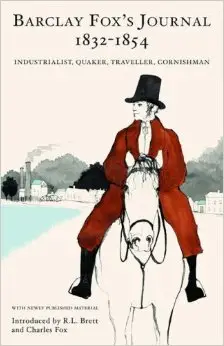
Barclay Fox m. Jane Gurney Backhouse (1816-1860)
Lloyd H Fox was the 3rd cousin 2x removed of Barclay Fox
and the 2nd cousin 2x removed of Jane Backhouse.
source: wikipedia (page since deleted)
Robert Barclay Fox (6 September 1817 – 10 March 1855) was a businessman, gardener and diarist, a member of the influential Quaker Fox family of Falmouth.
Family relationships
He was the son of Robert Were Fox F.R.S. of Falmouth in Cornwall and Maria (born Barclay of Bury Hill, Surrey), his wife. He was usually known as “Barclay Fox”.
He was the brother of Anna Maria and Caroline Fox and brother-in law of Edmund Backhouse, M.P. for Darlington, who married the Barclay’s cousin, Juliet.
The Journal
Barclay’s courtship of Jane Gurney Backhouse is described in his Journal, published in 1979. The 1979 edition of Barclay’s journal runs from 1832 to 1854, with most of the entries dating from before his marriage to Jane, in October 1844, and the birth of their five children: four boys and a girl. In September 2008, a new edition was published with additional journal entries from 1845 to 1854.
Polytechnic Society
Barclay and his siblings played a large part in the naming and establishment of the Cornwall Polytechnic Society (from 1835, the Royal Cornwall Polytechnic Society). After his death, the RCPS Committee recorded
“The Society, however, since our last meeting, has been deprived of the services of Mr. R. B. Fox, who, on all occasions, not only aided the institution by his varied and powerful intelligence but practically and laboriously assisted in carrying it on”.
Travels in 1843
In his diary for 1843, Barclay gives an entertaining account of his travels in France and Italy.
The family businesses
Before he left for the continent, on 6 February 1843, his family made him a partner in the firm of G.C. Fox (Shipping Brokers).[7]Barclay was also general manager of the Iron Foundry at Perranarworthal from 18 July 1842, when his uncle, Charles Fox, retired.
John Sterling
Barclay’s sister, Caroline Fox, also kept a journal, which was published after her death and later republished in 1972. Barclay and Caroline have interestingly different views on the same events that they witnessed. They were agreed on the great significance of John Sterling in their lives.
Politics and pleasure
Barclay Fox was one of the leaders of the ultimately unsuccessful campaign to persuade the Government not to shift the servicing of Post Office Packets from Falmouth to Southampton. He was part of a deputation of Cornish worthies who met the Prime Minister on 16 June 1843 (Journal page 345).
In his spare time, he developed Penjerrick Garden, competing with his uncles Charles Fox of Trebah and Alfred Fox of Glendurgan. All three gardens are now open to the public.
Death and after
Barclay Fox died in Egypt on 10 March 1855 from tuberculosis. His wife, Jane Fox died 10 April 1860. Their four sons were brought up by Barclay’s unmarried sisters, Anna Maria and Caroline, with Lovell Squire as their tutor. They were Robert Fox (1845 – 1915), George Croker Fox (1847 – 1902), Henry Backhouse Fox (1849 – 1936) and Joseph Gurney Fox (1850 – 1912), known as “Gurney”.[10] Robert Fox married Ellen Mary Bassett. Their son, Robert Barclay Fox (24 July 1873 – 22 April 1934), became a Conservative County Councillor and was High Sheriff of Cornwall in 1920.
The daughter of Barclay and Jane Fox, Jane Hannah Fox, was brought up by her mother’s brother, Edmund Backhouse (MP) and his wife. Jane Hannah Fox married Horace Pym, who edited Caroline Fox’s Journal for publication. She was his second wife. Barclay Fox’s own journal was published in 1979.